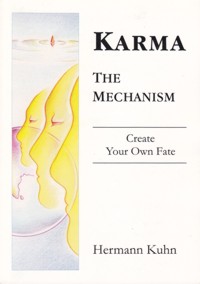
Shubhah punyasyashubhah papasya (3)
We experience two modes of karma:
- positive karma (punya) - manifests as a subjectively agreeable feeling of life (positive experiences) and ideally will further our inner growth. It is caused by activities we generally regard as positive ('good', 'virtuous').
- negative karma (paapa) - manifests as a subjectively disagreeable feeling of life (negative experiences) and obstructs our inner growth. It is caused by activities we generally regard as negative ('bad', 'evil'). (3)
In our present time we tend to question whether fundamental qualities like 'good' or 'bad' exist in the first place.
Though we generally regard violence, stealing, deceit, cruel words and envious, harmful thoughts etc. as fundamentally negative, our modern society is equally inclined to interpret actions based on positive intentions as 'good' and actions based on negative intentions as 'bad'.
Yet while it is basically true that our intentions determine whether an action, thought or word produces positive (punya) or negative (paapa) karma for us, this would ultimately mean that any positive intention - no matter where it is aimed - would justify killing, stealing, deception etc. as well.
But there exists one criterion that takes the relativity out of the concepts of 'good' and 'bad': - That what supports our inner growth, what removes obstacles, error etc. from our path to freedom from karmic restrictions and helps us to perceive our original radiant nature, is positive, 'good' (punya). It generally produces an agreeable, happy feeling.
That what hinders us to experience this positive feeling, what blocks our growth and obstructs the perception of our original, radiant nature, is negative, 'bad' (paapa). It generally produces a feeling of unhappiness.
In this understanding there do exist actions that - irrespective of the intention they are based on - have such negative character that they will always obstruct our inner development. These are all actions based on rage (anger), arrogance (pride), the intention to deceive others (manipulation) and greed (addiction) - the four basic negative emotions[7] - and further obsession, laziness, negligence, fanaticism etc.
Similarly there are positive activities that will always support our inner growth: - all actions inspired by compassion, by our orientation towards growth etc.
Ideals or intentions, as high as they might be, never justify means used for their achievement that fall short of the original goal. Each single step towards an ideal always needs to do full justice to its very core. Every action that does not correspond with our original aspiration reduces our ideal and fundamentally changes its direction, validity and impact.
The world as it appears to us in our present times, easily gives the impression that people undertaking actions defined as 'bad' are having far greater fun than those obediently restricting themselves to 'good' behavior.
Actions generally perceived as 'good' often seem boring, fettered by duty, governed by rigid rules and prompted by intellectual accord rather than gut-feeling. And further these types of action more often than not remain unrecognized - except by a certain kind of dull and uncreative people who define the adherence to firm rules as major purpose in their life - and try to motivate or force others to conform to this belief as well.
In stark contrast to this many actions we regard as 'bad' carry the thrill of the forbidden and are inspired by excitement, daring and creativity. When we engage in 'bad', 'forbidden' action, we often experience heightened intensity of life, substantially more energy, and in the end are rewarded with a high degree of satisfaction - irrespective if we were successful or not.
And this gut-feeling is basically right. Excitement and the exploration of unknown (forbidden) areas of life are generally far more intense and satisfying than the performance of any socially accepted, formal duty could ever be.
But the conclusion is not that we should choose 'bad' actions because they just seem more rewarding, - the conclusion is to take the boredom out of 'good' action.
As long as we perform 'good' actions only because we follow purely formal, religious or social motives, or because we want to please someone propagating the boring variation of 'good' action, we will always envy those having 'fun' with their 'bad' actions - even though we might outwardly condemn their activities - and even though we may take high pride in the amount of 'good' karma we supposedly accumulate by our own boring activities.
Yet this purely formal pursuit of 'the good' without real inner understanding, without real inner engagement and conviction does not at all accumulate 'good' karma. It only attaches us to more boredom, rigidity and negative emotions (resentment) against the 'bad' guys who seem to have all the fun.
We need to fundamentally understand why we are performing 'good' actions. We need to realize that exploring higher dimensions of consciousness is infinitely more exciting, vibrant and rewarding than any 'bad' - i.e. selfishly motivated - action governed by greed, anger, deception, pride, carelessness, obsession or laziness could ever be. Only with this inspiration deeply rooted in our emotions will our 'positive' activities produce the freedom from karmic attachments we yearn for - i.e. the freedom from persistently recurring uncomfortable, dissatisfying and frustrating situations and emotions.
We need to discard the misleading idea that 'good' actions necessarily have to be in harmony with commonly accepted views of society. Mahatma Gandhi's life is an excellent example that positive action can be highly creative, adventurous, exciting, powerful, daring and much more, yet he certainly upset all established opinions and disrupted much of the prevalent social consensus of his time. To seriously go for higher dimensions of our life takes far more courage, steadfastness and strength than the pursuit of the accepted, egoistic goals of a society which essentially are only geared towards preserving its current stagnant status-quo.
Since every action inevitably attracts karma that may possibly bind us, the question comes to mind whether we might not be better off to refrain from any activity - no matter if positive or negative.
From the perspective of the all-comprehensive underlying reality - nischaya-naya - this certainly is true. All activity attracts karma, may cause karmic bonds and thus obscure the radiant inner nature of our consciousness.
Yet from the practical perspective of daily life - vyavahara naya - the classification of action in positive ('good') and negative ('bad') proves of great help for our inner growth. The classification offers an orientation that simplifies decisions and judges complex actions on the basis: 'Does this expand my consciousness or not?'. The immediate effect that positive activities (punya) lead to agreeable subjective experiences and negative activities (paapa) to disagreeable feelings, creates a measuring tool that could not be simpler.
Life without action is no valid alternative for anyone still subject to karma. In that case we would be unable to release our existing karmic matter - i.e. our emotional attachment to limited themes of life - through action. Life without action would cement our present karmic state and also our current stage of development (see '14 Stages of Development') into eternal permanence.
 Hermann Kuhn
Hermann Kuhn
